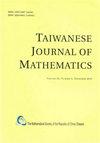Log Canonical Thresholds on Burniat Surfaces with $K^2 = 6$ via Pluricanonical Divisors
IF 0.6
4区 数学
Q3 MATHEMATICS
引用次数: 0
Abstract
. Let S be a Burniat surface with K 2 S = 6 and ϕ be the bicanonical map of S . In this paper we show optimal lower bounds of log canonical thresholds of members of pluricanonical sublinear systems of S via Klein group G induced by ϕ . Indeed, for a positive even integer m , the log canonical threshold of members of an invariant (resp. anti-invariant) part of | mK S | is greater than or equal to 1 / (2 m ) (resp. 1 / (2 m − 2)). For a positive odd integer m , the log canonical threshold of members of an invariant (resp. anti-invariant) part of | mK S | is greater than or equal to 1 / (2 m − 5) (resp. 1 / (2 m )). The inequalities are all optimal.K^2 = 6的燃烧曲面上的对数正则阈值
. 设S为一个Burniat曲面,其中K 2 S = 6, φ为S的双标准映射。本文通过Klein群G,给出了由φ诱导的S的多正则次线性系统的对数正则阈值的最优下界。实际上,对于正偶数m,一个不变量(正则表达式)的成员的对数正则阈值。逆不变)部分| mK S |大于或等于1 / (2 m)(相对于。1 / (2 m−2))。对于正奇数m,不变量(正则表达式)的成员的对数正则阈值。逆不变)部分| mK S |大于等于1 / (2 m−5)(p < 0.05)。1 / (2m))。不等式都是最优的。
本文章由计算机程序翻译,如有差异,请以英文原文为准。
求助全文
约1分钟内获得全文
求助全文
来源期刊
CiteScore
1.10
自引率
0.00%
发文量
35
审稿时长
3 months
期刊介绍:
The Taiwanese Journal of Mathematics, published by the Mathematical Society of the Republic of China (Taiwan), is a continuation of the former Chinese Journal of Mathematics (1973-1996). It aims to publish original research papers and survey articles in all areas of mathematics. It will also occasionally publish proceedings of conferences co-organized by the Society. The purpose is to reflect the progress of the mathematical research in Taiwan and, by providing an international forum, to stimulate its further developments. The journal appears bimonthly each year beginning from 2008.

 求助内容:
求助内容: 应助结果提醒方式:
应助结果提醒方式:


